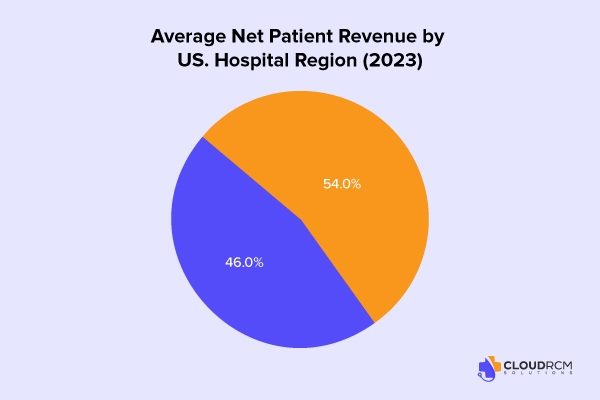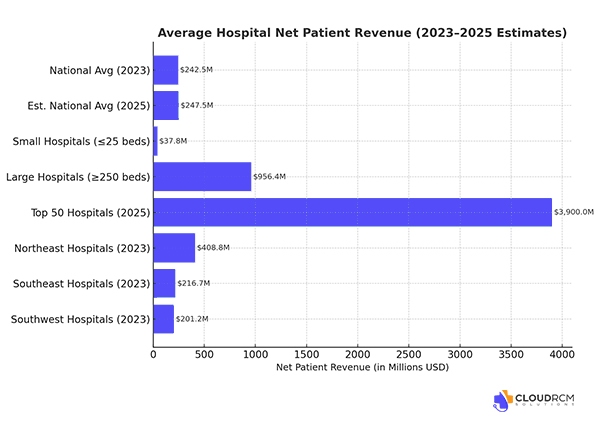Hospitals in 2025 face a dual reality: rising revenues but growing financial pressure from labor, drug, and compliance costs. Effective hospital billing services and strong revenue cycle management are critical to turn growth into sustainable cash flow.
In the first half of 2025, net operating revenue climbed 7% year-over-year, with gross revenue up 10.3% in June, the 26th straight month of growth. Outpatient revenue surged 12.3%, inpatient revenue rose 7%, and patient volumes increased (+8.2% outpatient, +3.7% inpatient).
What Are Hospital Billing Services?
Hospital billing services are the process of managing medical claims from creation and coding to claim submission, reimbursement, and follow-up, ensuring accurate payment from health insurance providers, Medicare, Medicaid, and patients.
These services aim to ensure that hospitals receive timely reimbursement for the care they have provided by adding the correct coding for the provided services, verifying insurance, submitting electronic claims, and managing payments.

2025 Hospital Revenue Trends
The Northeast led with $408.8 million net patient revenue, while the Southwest and Southeast saw the fastest growth. Operating margins improved to 3% in June 2025 (vs. 1.3% in 2024), but rising expenses, drug costs +9.8%, non-labor +8.2%, labor +3.8%, remain a challenge.
Average Hospital Net Patient Revenue in 2025
Hospital net patient revenue (NPR) is a key measure of financial performance, reflecting what hospitals actually collect after contractual allowances, bad debt, and charity care are factored in. Below is an updated snapshot of average NPR based on hospital size and region, using recent industry benchmarks.

Why Hospital Billing Services Matter for Financial Stability
As the hospitals in the U.S are dealing with the rising cost and tighter margins in 2025, hospital billing services have become essential to maintain the strong financial performance. Effective hospital revenue cycle management isn’t just about paperwork; it directly impacts a hospital’s ability to stay financially stable.
Reducing Claim Denials
Accurate medical coding and documentation minimize errors that lead to claim rejections. Fewer denials mean faster reimbursement and less time spent on costly appeals.
Ensuring Faster Reimbursements
Efficient billing processes improve the claim submission to Medicare, Medicaid, and private insurers. Quicker payments improve cash flow and support day-to-day operations.
Maintaining Compliance
Proper billing practices help hospitals meet payer and regulatory requirements. Compliance reduces the risk of audits, fines, or delayed payments.
Supporting Cash Flow & Growth
Strong billing practices prevent revenue leakage. Stable revenue allows hospitals to reinvest in staff, technology, and patient care.
Challenges in Hospital Billing & Revenue Cycle Management (2025)
While hospital revenues are climbing in 2025, many providers still face serious hospital billing challenges that impact their bottom line. Rising costs, payer complexities, and stricter regulations make it harder for hospitals to convert services into consistent revenue.
Rising Operating Expenses
Labor shortages, higher drug prices, and escalating non-labor costs continue to erode margins. Even as revenue increases, these expenses grow faster, leaving hospitals struggling to maintain profitability. Without efficient revenue cycle management, hospitals risk losing financial ground.
Higher Claim Denials Due to Payer Scrutiny
Insurance companies and government payers are applying tighter rules on claims. As a result, hospitals are experiencing more claim denials, which delay reimbursement and add to the administrative workload. Each denied claim means extra time, resources, and lost revenue if not corrected promptly.
Complex Regulatory & Payer Requirements
Hospitals must keep up with evolving CMS guidelines, Medicare and Medicaid billing updates, and varying private payer policies. Failure to comply with these shifting rules increases healthcare reimbursement issues, from delayed payments to financial penalties.
Administrative Burden on Hospital Staff
Billing teams are often overwhelmed by data entry, coding updates, and appeals management. This administrative strain reduces efficiency and takes staff away from focusing on patient care and operational improvements.
Role of EHR and EMR in Hospital Billing & RCM
Electronic Health Records (EHR) and Electronic Medical Records (EMR) are digital systems that store and manage patient medical information. These systems are essential for accurate hospital billing and revenue cycle management.
How EHR/EMR Improves Hospital Billing:
- Accurate Documentation: Captures detailed clinical data, enabling precise medical coding and reducing claim denials.
- Faster Claims Processing: Integrates with billing software to automate submissions and reduce delays.
- Regulatory Compliance: Maintains proper audit trails, helping hospitals stay compliant with Medicare, Medicaid, and private payer requirements.
- Better Access to Patient Data: Billing teams can quickly verify insurance, track payments, and improve cash flow.
- Improved RCM Integration: Modern EHR/EMR platforms connect directly with revenue cycle management systems, ensuring end-to-end billing efficiency.
How Outsourcing Hospital Billing Services Improves Revenue Cycle
For many healthcare organizations, managing billing in-house has become increasingly difficult due to rising costs, staffing shortages, and complex payer requirements. Partnering with an outsourced hospital billing provider can help practices improve operations, reduce expenses, and improve overall financial performance.
Faster Turnaround Times
An experienced medical billing company uses specialized technology and trained experts to process claims more quickly and accurately. This reduces billing delays, accelerates reimbursements, and keeps cash flow steady.
Lower Overhead Costs
Hiring and training in-house billing teams is costly. By choosing revenue cycle outsourcing, hospitals can reduce payroll expenses, technology costs, and administrative overhead while gaining access to skilled billing professionals at a fraction of the cost.
Better Compliance & Accuracy
Outsourced billing partners stay up to date with Medicare, Medicaid, and private payer regulations, ensuring accurate coding and claim submission. This reduces the risk of errors, claim denials, and compliance-related penalties.
Scalability for Growth
As patient volumes rise or services expand, outsourcing provides the flexibility to scale without adding internal staff. A trusted hospital billing services company can adapt to seasonal fluctuations, specialty billing needs, or sudden spikes in patient demand.
Final Thought
The future of hospital finance depends on more than just rising revenues; it requires efficient systems that convert services into timely reimbursements. With margins under constant pressure, hospitals can’t afford gaps in their billing and collections process. Partnering with the right revenue cycle management partner ensures accuracy, compliance, and steady cash flow.
At CloudRCM, we help hospitals overcome today’s hospital billing challenges with tailored medical billing solutions for hospitals that protect revenue and support long-term growth.
Why Partner with CloudRCM for Hospital Billing Services
Hospitals facing rising costs and tighter margins need a reliable revenue cycle management partner. At CloudRCM, we specialize in accurate coding, provider credentialing, improved claims management, and proactive denial prevention to maximize reimbursements. Our medical billing solutions for hospitals are designed to improve cash flow, reduce administrative burden, and ensure compliance.
Ready to stop revenue leakage? Call CloudRCM at (224) 231-6880 for a free hospital billing performance audit.
FAQs
What is hospital revenue cycle management?
It’s the process of capturing, managing, and collecting patient service revenue from registration and coding to claim submission and payment posting.
How do hospital billing services reduce claim denials?
By ensuring accurate coding, verifying insurance, and following payer rules, billing services cut errors that often lead to denials.
What is the average hospital net patient revenue in 2025?
On average, U.S. hospitals reported steady growth, with the Northeast leading at $408.8 million, and outpatient services driving a 12.3% revenue surge.
Why should hospitals outsource billing services?
Outsourcing lowers overhead, improves compliance, and speeds up reimbursements, helping hospitals focus more on patient care.
What are the biggest hospital billing challenges in 2025?
Rising labor and drug costs, stricter payer rules, and higher denial rates remain the top financial hurdles.
How does technology improve hospital billing?
Automation and AI tools speed up claim processing, reduce manual errors, and improve reimbursement timelines.

 Medical Billing
Medical Billing Medical Coding
Medical Coding Medical Audit
Medical Audit Provider Credentialing
Provider Credentialing Denial Management
Denial Management A/R Follow-up
A/R Follow-up Private Practice
Private Practice Patient Help Desk
Patient Help Desk Customized Reporting
Customized Reporting Internal Medicine
Internal Medicine Pediatrics
Pediatrics Radiology
Radiology Surgery
Surgery Emergency Medicine
Emergency Medicine Anesthesiology
Anesthesiology Cardiology
Cardiology Orthopedic
Orthopedic Psychiatry
Psychiatry Dentistry
Dentistry OB-GYN
OB-GYN Family Medicine
Family Medicine


